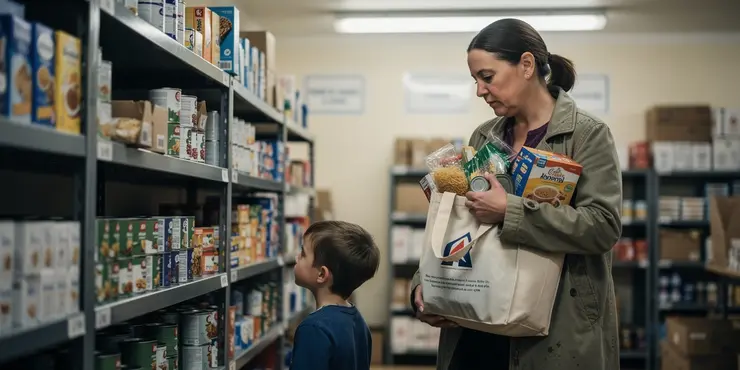
Find Help
More Items From Ergsy search
-

How Rising Living Costs Are Impacting Family Wellbeing
Relevance: 100%
-

Impact of Rising Living Costs on Family Health
Relevance: 82%
-

Understanding the Impact of Rising Living Costs on Family Welfare
Relevance: 80%
-

Rising Cost of Living: How Families Can Cope
Relevance: 71%
-

Essential Tips for Mental Health and Well-Being Amidst Rising Living Costs
Relevance: 65%
-

Financial Support for Families Amid Rising Cost of Living
Relevance: 63%
-

Impact of Rising Energy Costs on Family Budgets
Relevance: 62%
-

Addressing the Rising Cost of Living: Community Support and Resources
Relevance: 58%
-

Charities Warn of Food Insecurity Amidst Rising Cost of Living
Relevance: 56%
-

Navigating the UK Cost of Living Crisis: Tips for Families
Relevance: 53%
-
What is the £500 cost of living payment?
Relevance: 47%
-

Is the £500 cost of living payment taxable?
Relevance: 46%
-

What is the £500 cost of living payment?
Relevance: 45%
-

Is the £500 cost of living payment a one-time payment?
Relevance: 44%
-

Mental Health Impact of Cost of Living Crisis and Support Resources
Relevance: 44%
-

Are pensioners eligible for the £500 cost of living payment?
Relevance: 43%
-

Is the £500 cost of living payment taxable?
Relevance: 42%
-

Addressing the Cost of Living Crisis: Community Support and Resources
Relevance: 41%
-

Is the £500 cost of living payment a one-time payment?
Relevance: 41%
-

When will I receive the £500 cost of living payment?
Relevance: 41%
-

Are students eligible for the £500 cost of living payment?
Relevance: 40%
-

Will the £500 cost of living payment affect my benefits?
Relevance: 40%
-

Can students receive the £500 cost of living payment?
Relevance: 39%
-

Who is eligible to receive the £500 cost of living payment?
Relevance: 39%
-

How can I apply for the £500 cost of living payment?
Relevance: 38%
-

Where can I find more information about the £500 cost of living payment?
Relevance: 38%
-

Do I need to pay tax on the £500 cost of living payment?
Relevance: 37%
-

how do I get the £500 cost of living payment before March deadline?
Relevance: 37%
-

How do I apply for the £500 cost of living payment?
Relevance: 36%
-

Are there any fees to apply for the £500 cost of living payment?
Relevance: 36%
-

Impact of Rising Energy Prices on Household Budgets
Relevance: 35%
-

Where can I find more information about the £500 cost of living payment?
Relevance: 35%
-

How can students apply for the £500 cost of living payment?
Relevance: 35%
-

Social Services and Well-being (Wales) Act: Assessments
Relevance: 35%
-

Can I receive this payment alongside other cost of living payments?
Relevance: 34%
-

What is the relationship between rising rents and housing benefit cuts?
Relevance: 34%
-

Can mature students apply for the £500 cost of living payment?
Relevance: 33%
-

New Government Benefits for Low-Income Families
Relevance: 33%
-

What is the cost of living in a care home?
Relevance: 32%
-

Rise in Food Bank Usage Amid Economic Challenges
Relevance: 31%
How Rising Living Costs Are Impacting Family Wellbeing
Introduction
In recent years, the United Kingdom has seen a steady rise in the cost of living, which includes expenses related to housing, food, healthcare, and utilities. These increasing costs have significant ramifications on family wellbeing, affecting financial stability, mental health, and overall quality of life. This article seeks to explore how these rising costs are impacting families across the UK.
Financial Strain
One of the most immediate effects of rising living costs is financial strain. Families find it increasingly difficult to manage their budgets as everyday expenses consume a larger portion of their income. According to recent reports, average household expenses have risen faster than wages, leading to a gap that often forces families to make difficult financial decisions. Many are turning to credit cards or loans to cover basic needs, which can result in long-term debt and financial instability.
Mental Health Concerns
The financial pressures brought on by increasing living costs are having a significant impact on mental health among family members. Anxiety and depression rates are rising as individuals grapple with the uncertainty of their financial situations. Parents, particularly, experience stress from the dual burden of providing for their families while managing financial difficulties. This mental strain can affect relationships within the family and hinder effective communication, further exacerbating the issue.
Social Wellbeing
Rising living costs also affect social wellbeing. Families may find themselves cutting back on social activities and recreational pursuits to save money, which can lead to social isolation. Children, for instance, might miss out on extracurricular activities and social events, impacting their development and sense of normalcy. The inability to participate in social life can lead to a feeling of exclusion and a lower quality of life.
Healthcare Access
As the cost of living rises, some families may choose to forgo healthcare expenses to save money. Delaying or avoiding medical treatments and regular check-ups can have long-term health consequences. Additionally, the stress of financial strain can exacerbate existing health conditions, leading to a cyclical pattern of declining health and increasing medical costs.
Conclusion
The rising cost of living in the UK is undeniably impacting family wellbeing in multiple dimensions, from financial strain to mental health issues. Addressing these challenges requires concerted efforts from policymakers, community organisations, and families themselves to create sustainable solutions. By understanding the various ways that increased costs affect families, society can work towards mitigating the long-term negative consequences and improving overall family wellbeing.
How Rising Living Costs Are Impacting Family Wellbeing in the United Kingdom
Introduction
The rising living costs in the United Kingdom have become a pressing concern, affecting families' day-to-day lives and overall wellbeing. Increased expenses in housing, utilities, food, and transportation contribute to financial strain, leading to a cascade of challenges for households.
Financial Strain
Many families in the UK are experiencing financial strain due to increasing costs. Essentials such as food and energy bills have skyrocketed, leaving less disposable income for leisure, savings, or emergencies. Parents are forced to make difficult choices about where to allocate their limited resources, often impacting children's extracurricular activities or educational support.
Mental Health Challenges
The stress of managing a tight budget can take a toll on mental health. Anxiety and depression are rising as families worry about making ends meet. Parents under financial stress may experience increased tension, affecting relationships and leading to a less harmonious home environment.
Impact on Children's Wellbeing
Children's wellbeing can be indirectly affected by the financial challenges faced by their families. Parents may need to cut back on educational resources or extracurricular activities, limiting children's opportunities for development. Additionally, the stress felt by parents can trickle down, impacting children's emotional and mental health.
Housing Concerns
The UK’s housing market presents its own set of challenges, with rental and property prices continuing to rise. Many families are struggling to afford decent housing, leading to overcrowded living conditions or forcing them to move away from supportive communities and familiar surroundings, disrupting social networks crucial for wellbeing.
Coping Strategies and Support
In response to these challenges, families are adopting various coping strategies such as budgeting more strictly, seeking financial advice, and accessing community support resources. Local councils and charities have been instrumental in providing assistance, though demand often exceeds supply. Policy interventions aimed at stabilizing living costs and providing efficient support systems are crucial for long-term sustainability.
Conclusion
Rising living costs in the UK are more than just a financial burden; they significantly affect family wellbeing. Comprehensive strategies and policy changes are needed to mitigate these impacts, ensuring that families have the necessary support to thrive despite economic challenges.
How Rising Living Costs Are Impacting Family Wellbeing
Introduction
Things are getting more expensive in the United Kingdom. This includes things like houses, food, doctors, and bills. When these things cost more, it can be hard for families. It can be tough on their money, feelings, and how they live day to day. This article will talk about how these high costs are affecting families in the UK.
Financial Strain
When living costs go up, families feel pressure with money. It is getting harder to pay for everything with their income. Prices are going up faster than wages. Families sometimes need to use credit cards or borrow money to pay for basic things. This can make them owe money for a long time and feel worried about money.
Mental Health Concerns
Because money issues are stressful, people's feelings are being affected. More people feel anxious or sad because they worry about money. Parents feel pressure because they need to take care of their family and deal with money problems. This stress can make family members argue and not talk well with each other.
Social Wellbeing
When things cost more, families might have to stop doing fun activities to save money. This can make them feel lonely. Kids might not be able to join clubs or parties. This can make them feel left out and affect how they grow and learn.
Healthcare Access
If living costs are high, some families might skip going to the doctor to save money. Not going to the doctor or getting medicine can make people sicker over time. Stress from money problems can also make health problems worse. This can start a cycle of bad health and more doctor bills.
Conclusion
Living costs are going up in the UK, and it affects families in many ways, like money issues and feeling stressed. To help families, everyone needs to work together: the government, community groups, and families. With help, we can make things better for families and improve their lives.
How Rising Living Costs Are Impacting Family Wellbeing in the United Kingdom
Introduction
Living costs are going up in the United Kingdom. This means that families are finding it hard to pay for the things they need every day. Costs for housing, utilities, food, and getting around are going up. This puts stress on families.
Financial Strain
Many families are struggling with money because prices are going up. It costs more for food and energy. Families have less money left for fun things, saving money, or emergencies. Parents need to decide how to spend their money, which can affect children's activities and learning.
Mental Health Challenges
Worrying about money can make people feel stressed and sad. More people are feeling anxious because they worry about paying their bills. This stress can lead to more arguments at home. It can make it hard for families to get along.
Impact on Children's Wellbeing
When families have money problems, children can feel it too. Parents might have to cut back on things that help children learn and grow. This can mean fewer after-school activities or learning tools. If parents are stressed, children might feel upset too.
Housing Concerns
It's getting harder to find a good, affordable place to live in the UK. Houses and rent are getting more expensive. Some families live in crowded homes or have to move away from friends and familiar places, which can be tough.
Coping Strategies and Support
Families are trying different ways to manage their money better. They make budgets, ask for advice, and find help from their community. Local councils and charities are helpful, but they cannot always help everyone. It's important for the government to help keep living costs stable and offer support.
Conclusion
When living costs go up, it really affects family happiness and wellbeing. We need plans and changes in rules to help families live well, even when money is tight. Families need help to get through these tough times.
Frequently Asked Questions
How are rising living costs affecting family wellbeing in the UK?
Rising living costs are leading to increased financial stress, reduced savings, and the inability to afford basic necessities, which can impact mental health and family dynamics.
What specific living costs have increased the most in the UK?
Significant increases have been observed in housing, energy bills, groceries, and transportation costs.
How does the increase in energy bills affect families?
Higher energy bills mean families have less disposable income for other essentials, leading to tough choices about heating, food, and other necessary expenses, potentially affecting health and comfort.
What impact does the cost of housing have on family wellbeing?
High housing costs can result in less money for other essentials, overcrowding, and increased stress, which can strain family relationships and mental health.
How are grocery price increases impacting families?
Rising grocery prices force families to cut back on healthy foods, leading to poorer nutrition and increased stress about meal planning and budgeting.
What assistance is available for families struggling with rising costs?
Various government programs and local charities offer financial aid, food banks, and support services to help families cope with increased living costs.
How do transportation costs affect family life and wellbeing?
Increased transportation costs can limit job opportunities, affect school and extracurricular access for children, and reduce family time due to longer commutes.
What can families do to manage their budgets better amid rising costs?
Families can prioritize expenses, create a detailed budget, seek financial advice, and look for ways to reduce energy usage and other variable costs.
How does financial stress impact mental health in families?
Financial stress can lead to anxiety, depression, and tension within the household, affecting overall family wellbeing and individual mental health.
Are there specific groups more affected by rising living costs?
Low-income families, single-parent households, and those with fixed incomes, such as retirees, are often most affected by rising living costs.
What role does inflation play in rising living costs?
Inflation increases the price of goods and services, reducing the purchasing power of money, and making it more difficult for families to afford basic needs.
How can families adapt their housing situation in response to cost increases?
Families may consider downsizing, moving to more affordable areas, or exploring government-funded housing support options to manage housing costs.
What are long-term consequences of sustained high living costs on families?
Long-term consequences include depleted savings, increased debt, and potentially chronic stress, affecting health, relationships, and future financial stability.
How can community support mitigate the effects of rising costs on families?
Community support can provide resources, shared childcare, and pooled transportation to ease financial burdens and create a network of mutual aid.
What government policies could help alleviate the impact of rising living costs?
Policies such as increasing minimum wage, expanding housing assistance, controlling energy prices, and reducing taxes on necessities could help mitigate impacts.
How do higher living costs affect family happiness in the UK?
Things are getting more expensive. People are worried about money. They can't save much money. Some can't buy things they need every day. This can make people feel sad or worried. It can also cause problems in families.
Helpful Tips:
- Create a simple budget to keep track of money.
- Talk to friends or family if you feel worried.
- Use apps that help you save money or get discounts.
- Look for free activities in your community.
What things cost more money in the UK now?
Some things we buy cost more money now. Here are some things that cost more:
- Food at the supermarket
- Gas and electricity for your home
- Petrol for cars
- Rents for houses and flats
If it is hard to understand money, you can ask someone to help. You can also use tools like pictures or videos to learn more.
Prices are going up a lot for houses, energy, food, and transport.
How do higher energy bills affect families?
When energy bills go up, it costs more money to use things like lights, heating, and cooking. This can be hard for families.
They might have less money to spend on other things like food, clothes, or toys. Some families might worry about paying all their bills.
If reading is difficult, using pictures or talking about it with someone can help. There are also apps that can read out loud to you.
When energy bills go up, families have less money for other important things. They might have to make hard choices about heating, food, and other needs. This can make it hard to stay healthy and comfortable.
Here are some things that can help:
- Budgeting: Write down what you spend to see where you can save money.
- Support Programs: Look for help to pay for energy costs. Some groups offer discounts or money help.
- Use Less Energy: Turn off lights when not in use and unplug devices. This can save money on bills.
- Community Resources: Talk to local groups or community centers for more help and advice.
How does the price of homes affect family happiness?
Here is the question in simple words:
- How do the prices of houses and flats change how happy families are?
Here are some ideas to help understand better:
- If a house costs a lot, families may have less money for other things like food and fun.
- This can make families feel worried or stressed.
- When houses are not too expensive, families might feel happier and more relaxed.
Helpful tools or tips:
- Use pictures to help understand this idea.
- Talk with someone you trust about how you feel about this topic.
When houses cost a lot of money, people have less money for other things they need. This can make houses crowded. It can also make people feel more worried and stressed. This can make it hard for families to get along.
To help, use tools like voice-to-text or audiobooks. You can also try reading with a helper or in a quiet place.
How do higher grocery prices affect families?
When food prices go up, families need to spend more money to buy the same food. This can make it hard for families to buy enough food. They might need to buy less food or choose cheaper foods. This can be stressful for everyone.
To make shopping easier, families can:
- Make a shopping list before going to the store.
- Look for discounts or sales in the store.
- Try to buy food that is on sale or in season.
- Use coupons to save money.
Food at the store is getting more expensive. This makes families buy less healthy food. Eating less healthy food can make us feel bad. It can also make us worry about planning meals and money.
What help can families get if things cost too much?
If prices are going up, families might need help to pay for things.
Here are some ways to get help:
- Talk to a helper at a community center. They can give advice.
- Look for local groups that give food or clothes.
- See if the government can give money support.
Ask someone you trust to help you find more information.
There are programs and charities that help people. They give money, food, and other help to families who need it.
How do travel costs change family life and happiness?
Travel costs mean money spent to get around. This can be for buses, trains, or cars. 1. **Spending Money**: When families spend more on travel, they have less money for other things. This can make it hard to pay for food, clothes, or fun activities. 2. **Time Together**: If travel takes a long time, families have less time to be together. This can make them feel sad or stressed. 3. **Stress Levels**: Worrying about travel costs can make family members feel worried or tired. Some ways to help might include: - Using public transport, like buses or trains, which can be cheaper. - Planning trips to save time and money. - Carpooling with friends or family to share the cost. These ideas can help families save money and feel happier.When it costs more to travel, it can make it harder to find jobs. Kids might not be able to go to school or after-school activities easily. Families might also spend less time together because trips take longer.
Here are some tips to help:
- Use maps or apps to plan shorter or cheaper routes.
- Carpool with friends or neighbors to share the cost.
- Check public transport options like buses or trains.
- Plan trips ahead to use time and money wisely.
How can families take care of their money as prices go up?
Here are some ways to help:
- Make a list of what you need to buy.
- See if you can buy things that cost less.
- Look for special offers or discounts in stores.
- Try not to buy things you don’t need.
- Use a notebook to write down what you spend.
Ask someone you trust to help you with money questions.
Families can focus on spending money on important things first. They can make a simple plan for how to use money. Asking someone who knows a lot about money can help. Families can also save money by using less electricity and finding ways to spend less on other things. Tools like a budget app or a spreadsheet can be helpful.
How does money stress impact family feelings?
When families worry about money, it can make them feel sad or worried. This is called money stress.
Money stress can cause:
- Anger or fighting in the family
- Feeling sad or upset
- Having trouble sleeping
- Problems focusing at school or work
To help with money stress, families can:
- Talk to someone they trust
- Make a plan for spending money
- Do fun activities together to relax
- Speak to a counselor if needed
Worrying about money can make people feel sad, scared, or worried. It can also cause problems at home and make people feel upset. This can hurt how everyone in the family feels and thinks.
Tools like picture cards or calming apps can help people feel better.
Who has a harder time with things getting more expensive?
Some people find it harder when prices go up. Here are some who might struggle more:
- Older people who don't work anymore.
- People who do not earn much money.
- Families with a lot of children.
If you are finding things tough, here are some tips:
- Ask for help from a family member or friend.
- Use tools like budget planners to manage your money.
- Look for discounts or special offers when shopping.
When prices go up, it can be hard for families with little money. It can also be tough for families with only one parent and for people who get the same amount of money every month, like older people who have stopped working.
How does inflation make things more expensive?
Inflation means prices go up. Things like food and clothes cost more money. This makes it harder for families to buy the things they need.
Here are some tips to help:
- Use a budget: Plan how much money you can spend each week.
- Shop smart: Look for discounts and compare prices.
- Save money: Keep a little bit of money for emergencies.
How can families change their homes if things get more expensive?
When the cost of living goes up, families might need to think about how they can save money on their homes. Here are some simple ways to do that:
- Look for a smaller house or apartment. Smaller places usually cost less.
- Share a home with other people. Living with friends or family can help save money.
- Use less water and electricity to lower bills. Turn off lights when not needed and take short showers.
- Buy energy-saving appliances. These use less electricity and can save money over time.
- Talk to a money adviser. They can help you find more ways to save.
These ideas can help families spend less on their home and have more money for other things they need.
Families might think about moving to a smaller home, going to live in cheaper places, or looking for help from the government to pay for housing.
Tools like picture cards can help understand housing choices. Asking a friend or family member to explain can also be useful.
What happens to families when the cost of living stays high for a long time?
When things like food, rent, and bills become expensive and stay that way, it can be hard for families. Let's talk about how this can affect them:
- Money Worries: Families might find it hard to pay for important things. This can make them feel worried and stressed.
- Less Savings: When families spend more on daily needs, they might not have extra money to save for the future.
- Changes in Living: Families might need to change how they live. They might move to a smaller place or cut back on fun things like trips.
- Health and Happiness: Worrying about money can make people feel sad or anxious. It can also make them not feel well.
If you're finding things hard, here are some ways to get help:
- Talk to someone you trust about how you feel.
- Look for community programs that offer support with food or rent.
- Use smartphone apps that help you budget and keep track of spending.
In the future, you might have less money saved up, owe more money, and feel worried for a long time. This can make you not feel very well, cause problems with friends and family, and make it harder to manage money later on.
How can people in the community help families with rising costs?
When prices go up, families have a hard time paying for things. People in the community can help make it easier for families. Here are some ways this can happen:
- Food Banks: Places that give free food to families who need it.
- Support Groups: Meetings where people talk and help each other.
- Sharing Rides: Traveling together to save money on gas.
- Community Events: Fun activities that are free or low cost.
- School Supplies: Giving extra school things to families with kids.
Families can also use tools like budget planners to help manage money better.
Community support can help people save money. It does this by sharing things like childcare and rides in cars. It also helps people work together and help each other out.
How can the government help with rising living costs?
Living costs mean how much it costs to pay for things we need every day, like food, housing, and transport. When living costs go up, it can be hard for people to afford these things.
Here are some ways the government can help:
- Lower taxes: The government can cut the amount of money we pay in taxes so people have more money to spend.
- Help with housing: The government can build more homes and make renting cheaper.
- Support with bills: The government can give money to help people pay their water, heating, and electricity bills.
- Cheaper transport: The government can make buses and trains cheaper to help people get around.
- Increase wages: The government can make sure workers get paid more money so they can afford things they need.
Try using a dictionary to understand new words or ask someone for help. Reading with a friend or family member can also be fun and helpful.
These ideas might help people:
- Make sure workers earn more money.
- Provide more help with finding and paying for homes.
- Keep gas and electric bills from going too high.
- Lower taxes on things people need every day.
Using tools like large-print text or listening to audiobooks can also be helpful.
Useful Links
This website offers general information and is not a substitute for professional advice.
Always seek guidance from qualified professionals.
If you have any medical concerns or need urgent help, contact a healthcare professional or emergency services immediately.
Some of this content was generated with AI assistance. We’ve done our best to keep it accurate, helpful, and human-friendly.
- Ergsy carfully checks the information in the videos we provide here.
- Videos shown by Youtube after a video has completed, have NOT been reviewed by ERGSY.
- To view, click the arrow in centre of video.
- Most of the videos you find here will have subtitles and/or closed captions available.
- You may need to turn these on, and choose your preferred language.
- Go to the video you'd like to watch.
- If closed captions (CC) are available, settings will be visible on the bottom right of the video player.
- To turn on Captions, click settings .
- To turn off Captions, click settings again.
More Items From Ergsy search
-

How Rising Living Costs Are Impacting Family Wellbeing
Relevance: 100%
-

Impact of Rising Living Costs on Family Health
Relevance: 82%
-

Understanding the Impact of Rising Living Costs on Family Welfare
Relevance: 80%
-

Rising Cost of Living: How Families Can Cope
Relevance: 71%
-

Essential Tips for Mental Health and Well-Being Amidst Rising Living Costs
Relevance: 65%
-

Financial Support for Families Amid Rising Cost of Living
Relevance: 63%
-

Impact of Rising Energy Costs on Family Budgets
Relevance: 62%
-

Addressing the Rising Cost of Living: Community Support and Resources
Relevance: 58%
-

Charities Warn of Food Insecurity Amidst Rising Cost of Living
Relevance: 56%
-

Navigating the UK Cost of Living Crisis: Tips for Families
Relevance: 53%
-
What is the £500 cost of living payment?
Relevance: 47%
-

Is the £500 cost of living payment taxable?
Relevance: 46%
-

What is the £500 cost of living payment?
Relevance: 45%
-

Is the £500 cost of living payment a one-time payment?
Relevance: 44%
-

Mental Health Impact of Cost of Living Crisis and Support Resources
Relevance: 44%
-

Are pensioners eligible for the £500 cost of living payment?
Relevance: 43%
-

Is the £500 cost of living payment taxable?
Relevance: 42%
-

Addressing the Cost of Living Crisis: Community Support and Resources
Relevance: 41%
-

Is the £500 cost of living payment a one-time payment?
Relevance: 41%
-

When will I receive the £500 cost of living payment?
Relevance: 41%
-

Are students eligible for the £500 cost of living payment?
Relevance: 40%
-

Will the £500 cost of living payment affect my benefits?
Relevance: 40%
-

Can students receive the £500 cost of living payment?
Relevance: 39%
-

Who is eligible to receive the £500 cost of living payment?
Relevance: 39%
-

How can I apply for the £500 cost of living payment?
Relevance: 38%
-

Where can I find more information about the £500 cost of living payment?
Relevance: 38%
-

Do I need to pay tax on the £500 cost of living payment?
Relevance: 37%
-

how do I get the £500 cost of living payment before March deadline?
Relevance: 37%
-

How do I apply for the £500 cost of living payment?
Relevance: 36%
-

Are there any fees to apply for the £500 cost of living payment?
Relevance: 36%
-

Impact of Rising Energy Prices on Household Budgets
Relevance: 35%
-

Where can I find more information about the £500 cost of living payment?
Relevance: 35%
-

How can students apply for the £500 cost of living payment?
Relevance: 35%
-

Social Services and Well-being (Wales) Act: Assessments
Relevance: 35%
-

Can I receive this payment alongside other cost of living payments?
Relevance: 34%
-

What is the relationship between rising rents and housing benefit cuts?
Relevance: 34%
-

Can mature students apply for the £500 cost of living payment?
Relevance: 33%
-

New Government Benefits for Low-Income Families
Relevance: 33%
-

What is the cost of living in a care home?
Relevance: 32%
-

Rise in Food Bank Usage Amid Economic Challenges
Relevance: 31%


